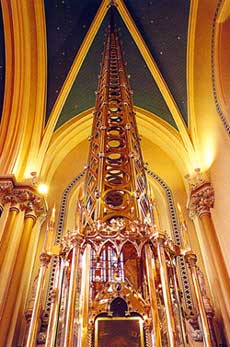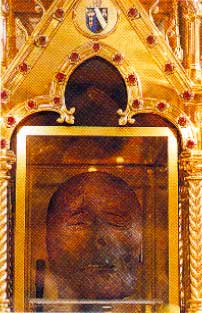
Shrine of St Oliver, St Peter’s Drogheda
(design by Jeffrey Johnson)
St Oliver Plunkett was born into an aristocratic Anglo-Irish family at Loughcrew in County Meath on 1st November 1625. This was during the Penal Laws when the Catholic Church and her ministers were suppressed. The faith was not allowed to be practised openly and the celebration of Mass and the various Sacraments was banned.
Oliver went to Rome in 1647 to study for the priesthood and was ordained in 1654. After three years at San Gerolamo della Carita he was appointed professor of theology in the College of Propaganda Fide. In 1669 he was appointed as Archbishop of Armagh. He worked tirelessly in the pastoral care of his flock. At first he was able to work openly but later, when the political situation changed, he was obliged to go into hiding. Even then, however, at great peril to himself, he continued to minister to his people.
In 1679 Archbishop Plunkett was arrested on a charge of treason. False witnesses testified against him but a jury in Ireland, made up entirely of Protestants would not convict him. He was transferred to London and tried there for treason. In a scandalous travesty of justice, he was convicted and sentenced to death. He was hanged at Tyburn in England on 1st July 1681. His head was rescued from the fire by some of his friends and eventually made its way to St Peter’s Church, Drogheda, where it is housed in a specially made shrine for veneration.
Oliver Plunkett was beatified in 1920 and canonised in 1975. In 1979, Pope John Paul II venerated the relic of St Oliver Plunkett during the Drogheda part of his Papal visit to Ireland.
The Feast of St Oliver Plunkett occurs annually on the anniversary of his death, 1st July. Special celebrations are held each year on this date in Drogheda. A procession of the Saint’s relic is made from Our Lady of Lourdes Church, Hardman’s Gardens to the Church of St Peter, West Street. A Mass in honour of St Oliver Plunkett is held in St Peter’s Church on the last Friday of each month at 7.30 pm. Further information may be obtained from www.saintpetersdrogheda.ie or see under Patrick and the Saints above.




You must be logged in to post a comment.